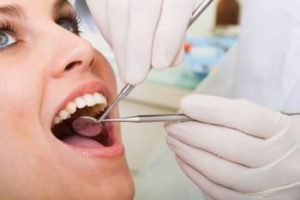 Brushing your teeth twice a day? Great! Flossing on a regular basis? That’s awesome! Regular brushing and flossing is a vital step in the fight against cavities and gum disease, but it’s only part of the battle.
Brushing your teeth twice a day? Great! Flossing on a regular basis? That’s awesome! Regular brushing and flossing is a vital step in the fight against cavities and gum disease, but it’s only part of the battle.
Even with regular brushing and flossing, plaque, tarter, and bacteria can build up in your mouth. All these factors can create the perfect storm (as well as sugar) that cause dental problems like cavities and gum disease. If left untreated, cavities and gum disease can lead to costly dental procedures and the loss of a tooth (or many teeth). Brushing and flossing can remove some of the plaque, tarter, and bacteria—but not all (and sometimes not even most of it).
Regular dental cleanings give your mouth a deep clean (gums and teeth), removing as much plaque, tarter, and bad bacteria as possible. In addition, a dental cleaning also removes stains on teeth (i.e. from coffee, wine, etc.) and freshens breath. Dental cleanings can halt the progression of serious dental problems (i.e. cavities, gum disease, tooth decay, etc.) and save you from paying for fairly costly dental procedures.
The general rule of thumb for teeth cleanings is that patients should schedule a dental cleaning once or twice a year. This guideline applies to patients who do not exhibit signs of gum disease or bone loss in the mouth. These patients receive the most common dental cleaning called prophylaxis.
Just as with everything in life, the general rule of thumb (once or twice a year dental cleanings) applies to some people but not to everyone. For others exhibiting early signs of bone and gum disease or battling gum disease, a more intense deep clean is recommended—and more often than twice a year. There are two kinds of deep dental cleanings offered for these patients:
Root planing and scaling
Root planing and scaling is not only a more intense dental cleaning than prophylaxis, it also covers more of the mouth. Root planing and scaling cleans your mouth from the top down to the roots, removing plaque, tarter, bacteria and diseased deposits from the mouth. This kind of cleaning is recommended for patients showing the signs of bone and gum disease and should be scheduled as often as the dentist recommends.
Periodontal maintenance
Periodontal maintenance is not a single dental cleaning appointment, but a series of dental cleaning and therapies. These appointments can be scheduled as often as every three months and are performed to stop the progression of gum disease. Because these deep cleanings remove the bacteria, tarter, and plaque and remove diseased tissue, patients need to make every effort to keep the appointments. Periodontal maintenance also maintains healthy gums and sustain bone structure. If your dentist recommends periodontal maintenance, check with your insurance for coverage details.





